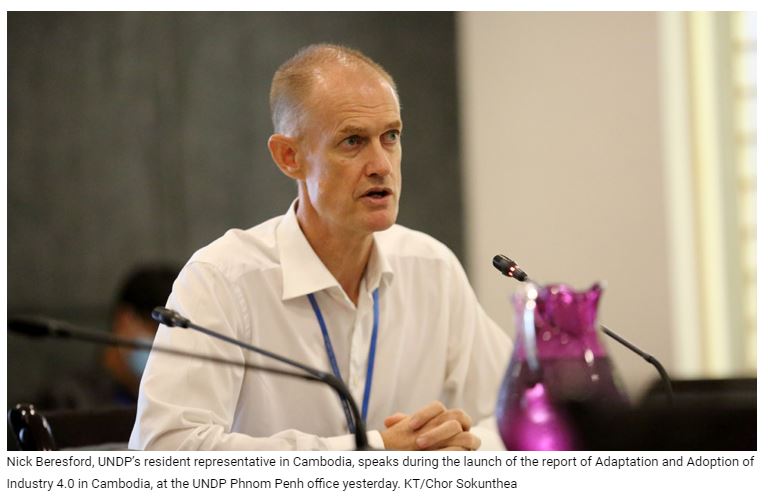Industry 4.0: How Cambodia can build for the future
A conference was held at the UN Development Programme (UNDP) head office in Phnom Penh as well as over video conference to discuss a new report conducted by the UN and the Institute for Manufacturing Educational Consultancy Services (IfM ECS) within the University of Cambridge.) The IfM is a division of the University of Cambridge’s Department of Engineering
It provides consultancy and executive and professional development – based on the new ideas and approaches developed at the IfM – to help policymakers and manufacturing and technology companies around the world create and capture value more effectively
Its profits are gifted to the University of Cambridge to fund future research
It works with some of the world’s leading multinationals (including Atos, BAE Systems, BP, Caterpillar, GSK, Linde, Mars, Rolls-Royce, Shell and Unilever), mid-size companies and more than 1,000 small and medium enterprises and early stage ventures in the UK and national and regional governments to help them to create the conditions in which science and technology can be successfully commercialised
Yesterday’s Phnom Penh conference was to identify opportunities and challenges for manufacturing industries in Cambodia on how to adapt and adopt Industry 4.0 technologies – also known as the Fourth Industrial Revolution – and policy options required to harness its potential in the Kingdom
But the level of Industry 4.0 adoption in Cambodia is still slow, as is the case in many developing countries
Stakeholders who were consulted suggested that digital technology in the vast majority of tech firms (more than 90 percent) is still at a basic level
The barriers and holdbacks found in adopting Industry 4.0 included: a lack of awareness of digital technologies and their benefits, the perceived high costs of new technology, a reluctance to use it and then skill gaps caused by limited access to training and technical assistance
Cambodia does, however, have the opportunity to build on a number of conditions, while trying to support the adoption of these new technologies, including Industry 4.0
The Kingdom has a growing economy with increasing foreign direct investment (FDI) and a demographic dividend of young educated people
A number of initiatives are already being put into place to promote the technology and innovation sector in Cambodia, including strategic framework for Cambodia’s digital economy
Opportunities also exist to exploit technological spill-overs from FDI, leverage the participation in global value and further develop established international economic partnerships
“Far too few enterprises in Cambodia are aware of, let alone access, new Industry 4.0 technology
As a result, the economy is missing out on big productivity gains and workers are missing out on high skilled jobs and better pay
This report is an excellent counterpart to the work undertaken by the Royal Government on Cambodia’s Digital Strategy and we are keen to synergise the two,” said Nick Beresford, UNDP Cambodia’s resident representative
The recent report paves the way for further stages: a detailed survey of industrial practices, also reflecting any COVID-19 impacts, and the development of policy mechanisms to ensure technology transfers in the future
The conference ended with Mey Kalyan, senior adviser of the Supreme National Economic Council, based in Phnom Penh, saying: “We can talk and talk but we then need to put things into action and start with something practical
This report is important but we need to digest it and then implement it here in Cambodia.” 00000000000 THE Ministry of Tourism has outlined a master plan for Mondulkiri’s tourism development to make the province more attractive, contributing to support local socio-economic growth and job creation, according to Minister Thong Khon
It was made in the consultative workshop on the preliminary draft master plan for tourism development in Mondulkiri province, involving the private sector, national and international organisations
Khon said the development plan focused on the vision for the province’s tourism development, zoning for tourism development, strategic orientation, key priorities and institutional mechanisms to implement the master plan
“The development of tourism in Mondulkiri province must adhere to the approach of sustainable development and responsibility, conservation for the benefit of the economy, society and people,” he said, adding that the development must be a basic contribution to the maintenance, protection and conservation natural resources and special cultural heritage preserve of the original identity of Mondulkiri province
He said the development must respond to the vision of national development in 2020-2035 based on the current situation and the commitment of the government
The plan also determines the scope of investment-development activities in the five wildlife sanctuaries (Phnom Prech, Nam Lear, Lumphat, Keo Seima and Sre Pok) and the Busra Cultural and Ecotourism Corridor, encouraging the development of tea, ecotourism and ecotourism activities in conjunction with indigenous cultural tourism, particularly should be encouraged to strengthen the tourism community in a good and effective manner
The minister also urges the registration of major tourist resorts in the province as soon as possible to ensure the sustainability and efficiency of the use and development of these areas
“Provincial authorities at all levels and skills must strictly and strictly implement the orders of the head of the government to prevent encroachment on state land, forest land as private property,” he said
Khon said previously that the development of tourism in Mondulkiri province will require continued investment in transportation infrastructure – particularly in the region’s airport – which will play a vital role to service both tourists and light freight
Source: https://www.khmertimeskh.com/50754083/industry-4-0-how-cambodia-can-build-for-the-future/


 English
English




